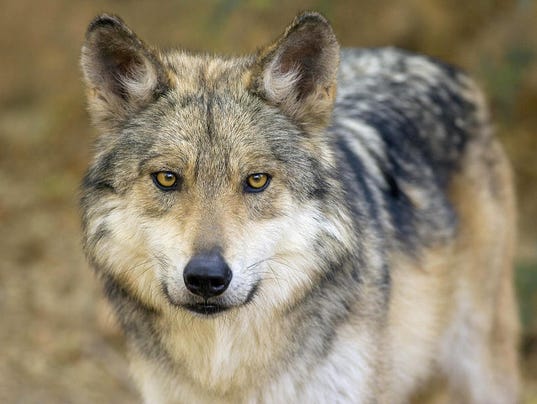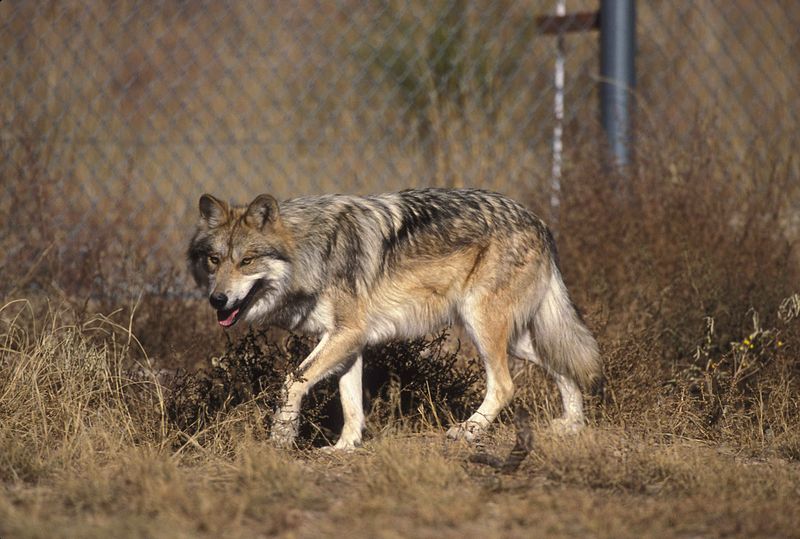 |
| Mexican wolf |
A recent count of Mexican wolves by the U.S Fish and Wildlife Service has raised concerns among wolf advocates that inbreeding among the animals' population in Arizona and New Mexico has led to a decrease in growth. The agency, which is assigned with managing a 20-year-old program for the wolves, reported that there were 114 animals in the wild which was just one more than in 2016. In the last three years, there had been a surge of less than 5 percent in the wolf population, following roughly two years of strong growth. In the latest wolf count report, the agency mentioned a sharp decline in wolf pup survival numbers. It indicated that 50 pups survived in 2016 after being born in that year, while only 26 survived last year. In addition, 12 recorded wolf deaths were cited in 2017 and 10 wolves that were eliminated from the wild packs. When asked if the mild, dry winter affected the wild wolf numbers, U.S Fish and Wildlife Service spokesman John Bradley stated that the agency did not have data on the impact of climate factors but will be looked into.
 |
| Mexican wolf running |
The agency's management of the wolf packs has been heavily criticized by the Center for Biological Diversity and members of other advocacy groups, who alleged that negligent supervision of wolf poaching and inbreeding is also contributing to the decline in wild wolf population. According to Michael Robinson of the Center for Biological Diversity, almost every wild Mexican wolf is so genetically similar to each other that they are related as if they are siblings. Mr. Bradley also agreed to the problem of inbreeding and indicated that the process of cross-fostering wild-born wolf pups with captive-born ones to help expand the animals' gene pool. However, Mr. Robinson called the solution "imperfect and not fitting the genetic emergency." He further elaborated on the difficulty of the process saying how it requires the staff to find a wolf den in which the timing of a litter's birth should firmly match that of a captive-born litter and regulating a quick exchange of pups in the wilderness shortly after they are born. He also added that even if all goes as steadily as possible, it takes about two years for a wolf pup released into the wild to start breeding.
 |
| Mexican wolf in captivity |
I find it extremely disturbing on what the Center for Biological Diversity and other advocacy groups found about this recent report by the U.S Fish and Wildlife Service regarding the Mexican wolf population in the country. These animals are under grave risk of inbreeding because of the way the agency has been managing their population. This issue could have been avoided had breeding-age adult wolves been released into the wild from captivity. I really think that conserving Mexican wolves in the U.S is a task that should be best done by the Center for Biological Diversity and other groups that have the tremendous knowledge and expertise on how to properly manage populations of critically endangered and other threatened species. Furthermore, the recovery plan of the Mexican wolf should not be driven by both federal and state politics. People need to understand that the conservation of Mexican wolves and other endangered species is best done by conservation groups and similar organizations that have the knowledge and expertise on how to better maintain their populations. I urge the U.S Fish and Wildlife Service to please leave the conservation of Mexican wolves to the Center for Biological Diversity and other advocacy groups. These magnificent animals are on the brink of extinction and any misuse of conserving them can result in extinction.
View article here
No comments:
Post a Comment